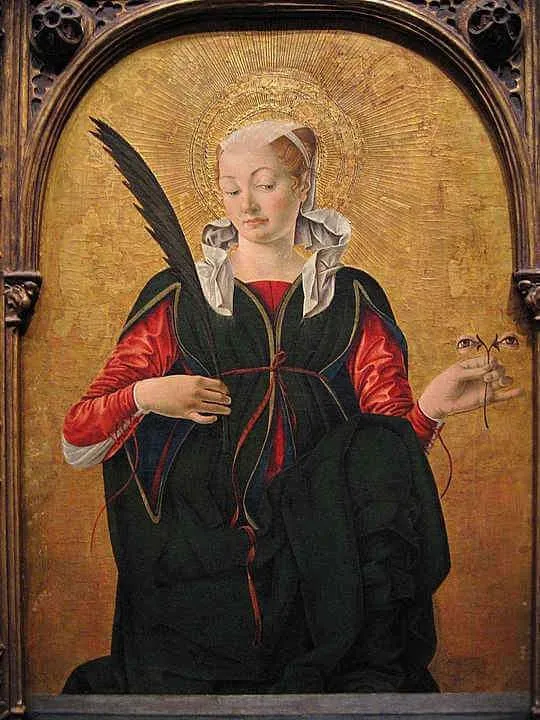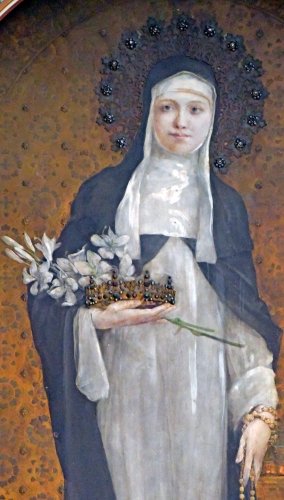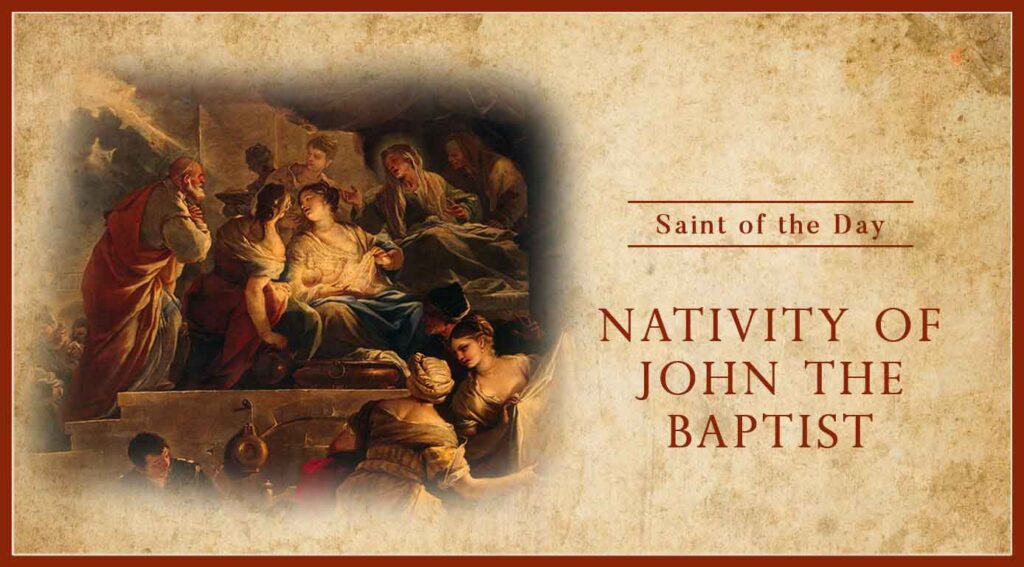c. 283–c. 304; Patron Saint of blind people, martyrs, peasants, penitent prostitutes, poor people, sick children, authors, cutlers, farmers, glassmakers, glaziers, gondoliers, laborers, lawyers, maidservants, notaries, eye doctors, porters, printers, saddlers, sailors, salesmen, seamstresses, tailors, upholsterers, weavers, and writers; Invoked against dysentery, epidemics, hemorrhages, throat infections, fire, poverty, and spiritual blindness; Pre-Congregation canonization
It takes great faith to exclaim that torture and death are glorious when they result from your love of Christ, yet this type of faith has been present in countless martyrs throughout the history of the Church. The earliest centuries of the Church especially produced holy martyrs who endured the attempted extinction of Christianity by the Roman emperors who clung to their pagan gods. Such was the case with today’s saint, Saint Lucy of Syracuse, who died during the Great Persecution of Roman Emperor Diocletian. Though historical details are hard to confirm, as early as the fifth century, beautiful legends about Saint Lucy had been handed down. It is those legends that follow.
Lucy was born in Syracuse, Sicily, around the year 283 to Christian parents. When she was five, her father died, leaving her mother, Eutychia, to raise her alone. Eutychia suffered from hemorrhages and feared for Lucy’s future, so she arranged a promise of marriage for her daughter to a nobleman from a pagan family.
A half century earlier, the holy virgin Saint Agatha had been martyred forty miles north of Syracuse in the city of Cantania. Saint Agatha was revered as the glory of Cantania. Her tomb became a popular place of pilgrimage and site of many miracles. Hopeful of a cure of her mother’s hemorrhages, Lucy convinced her mother to make a pilgrimage to Saint Agatha’s tomb. Eutychia agreed. While at the tomb, the two fervently prayed for a long time. As they did, Lucy had a dream-like vision in which Saint Agatha appeared to her, informing her that her mother would be cured because of Lucy’s faith, and that Lucy would become the glory of Syracuse, just as Agatha was the glory of Cantania. When Lucy awoke from her vision, she cried out, “O, mother, mother, you are healed!”
From that moment on, Lucy continued to sense Saint Agatha speaking to her about her calling to be a Bride of Christ and to die as a martyr. She informed her mother of her desire to remain a virgin and begged her to offer their wealth to the poor. Her mother hesitated, suggesting it would be better for Lucy to do so once Eutychia had died, but Lucy urged her to do so right away because it would be a source of much greater merit. Lucy’s faith won the day. She continued to postpone her marriage and spent the next few years joyfully distributing her money and jewels to the poor.
In the year 303, Roman Emperor Diocletian issued an edict outlawing Christianity in the Roman Empire. Christian Churches and sacred texts, such as Scripture and liturgical books, were to be destroyed. Christians were forbidden to gather for worship. Civil servants and nobility were stripped of their ranks and belongings. Christians who were discovered were forced to offer sacrifice to the Roman gods and the emperor; those who refused were tortured and even killed.
Though this was clearly a grave evil to befall those who professed their faith in Christ, it also resulted in a strengthening of faith for many. Secret worship regularly took place at the risk of the worshippers’ lives. Honored martyrs inspired the faithful to imitate the martyrs’ steadfast faith.
Around the year 304, when Lucy was around the age of twenty-one, her suitor became aware of the large sums of money that she had distributed to the poor. He was also aware that Lucy had done so on account of her Christian faith and realized that she was not going to become his bride. Enraged, he reported Lucy to Paschasius, the Governor of Syracuse, denouncing her as a Christian.
When Governor Paschasius of Syracuse learned of Lucy’s Christian faith and her charity to the poor, he had her arrested and interrogated. He attempted to force her to apostatize by offering sacrifice to the Roman gods, but she refused. A later Roman martyrology put these words into Lucy’s mouth:
I know but one sacrifice pure and full of honor, which I can offer. This is to visit orphans and widows in their tribulation, and to keep oneself unspotted from the world. For three years, I have daily offered this sacrifice to my God and Father; and now I long for the happiness of offering myself to Him as a living victim. His holy will be done!
Lucy then accused the governor of demon worship and prophesied his condemnation before God. The governor was outraged and ordered her to be defiled in a brothel. When the guards tried to move her, she was heavier than a boulder. They even tried to move her with a rope tied to the yoke of oxen, but she didn’t budge. The guards then surrounded her with wood to burn her, but the flames did not harm her. Finally, the governor ordered a soldier to thrust his sword into her neck, and God permitted her martyrdom to be completed. One martyrology attributes these prophetic words to her as she was dying:
I announce to you a great joy. Diocletian descends from his throne, Maximian dies, the Church breathes again: peace extends its protecting wing over the martyred Saints. O Syracuse, O place of my birth, as Catania finds its safety and glory beneath the guardianship of my sister Agatha, so shalt thou be shielded by me, if thou art willing to embrace that Faith, for the truth of which I shed my blood.
Saint Lucy is often depicted in sacred art holding her eyes because much later legends state that either the guards gouged her eyes out as torture, or that she gouged her own eyes out so that her suitor would no longer be tempted by their beauty.
Veneration to Saint Lucy quickly spread, and her prophetic dream-vision came true—she became the glory and protector of Syracuse and the source of many miracles. By the end of the sixth century, she was so revered throughout the Roman Empire that Pope Saint Gregory the Great inserted her name into the Roman Canon (Eucharistic Prayer I)—“…graciously grant some share and fellowship with your holy Apostles and Martyrs: with John the Baptist, Stephen, Matthias, Barnabas, Ignatius, Alexander, Marcellinus, Peter, Felicity, Perpetua, Agatha, Lucy, Agnes, Cecilia, Anastasia and all your Saints…”
The fact that a young virgin martyr would become so revered and honored for many centuries after her birth is a testimony to the power of God. Saint Lucy not only imitated her Lord, but in her humility, she reflected the glory of the Mother of God who, in her song of praise, proclaimed, “For he has looked upon his handmaid’s lowliness; behold, from now on will all ages call me blessed. The Mighty One has done great things for me, and holy is his name…” (Luke 1:49–49).
As we honor this saint who was crowned with virginity and martyrdom, ponder the courage and resolve she had to choose death over a life of nobility. She fell in love with her divine Spouse, He entered into union with her, and she turned her eyes firmly upon His holy will. Seek to imitate Saint Lucy’s courage and resolve, choosing Christ and Him alone, renouncing all that is contrary to His holy will.
Source: https://mycatholic.life/saints/saints-of-the-liturgical-year/13-december-saint-lucy-of-syracuse-virgin-and-martyr–memorial/







